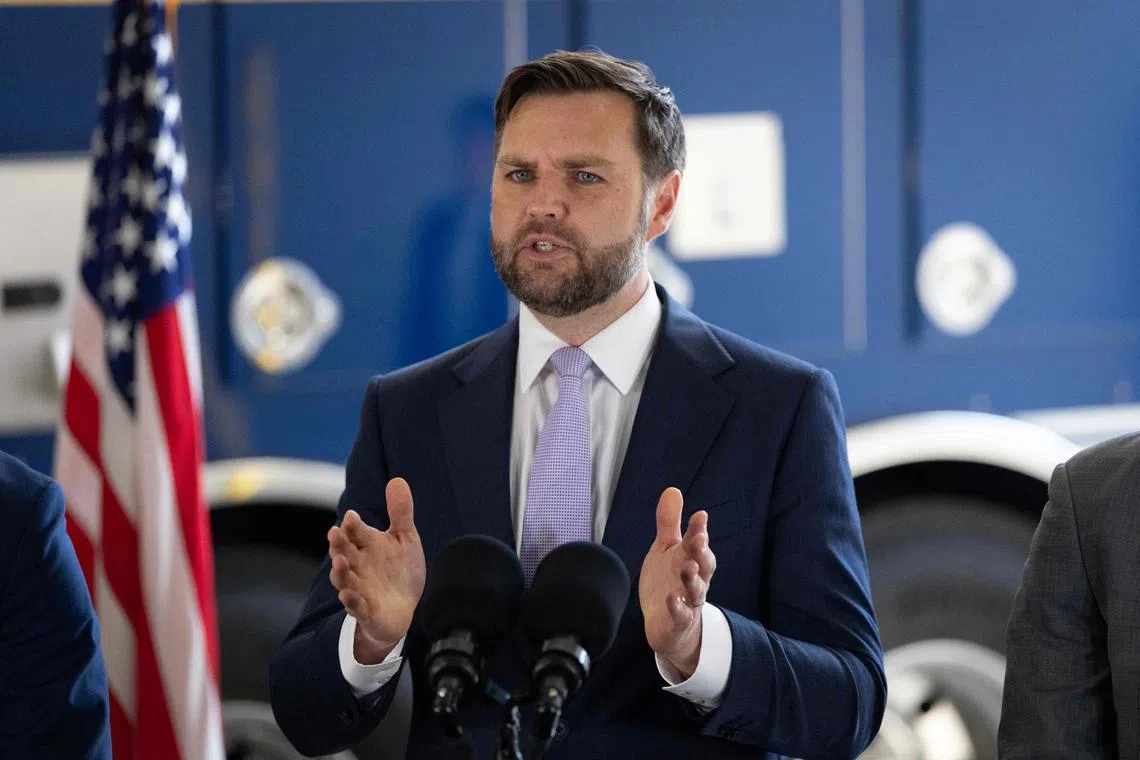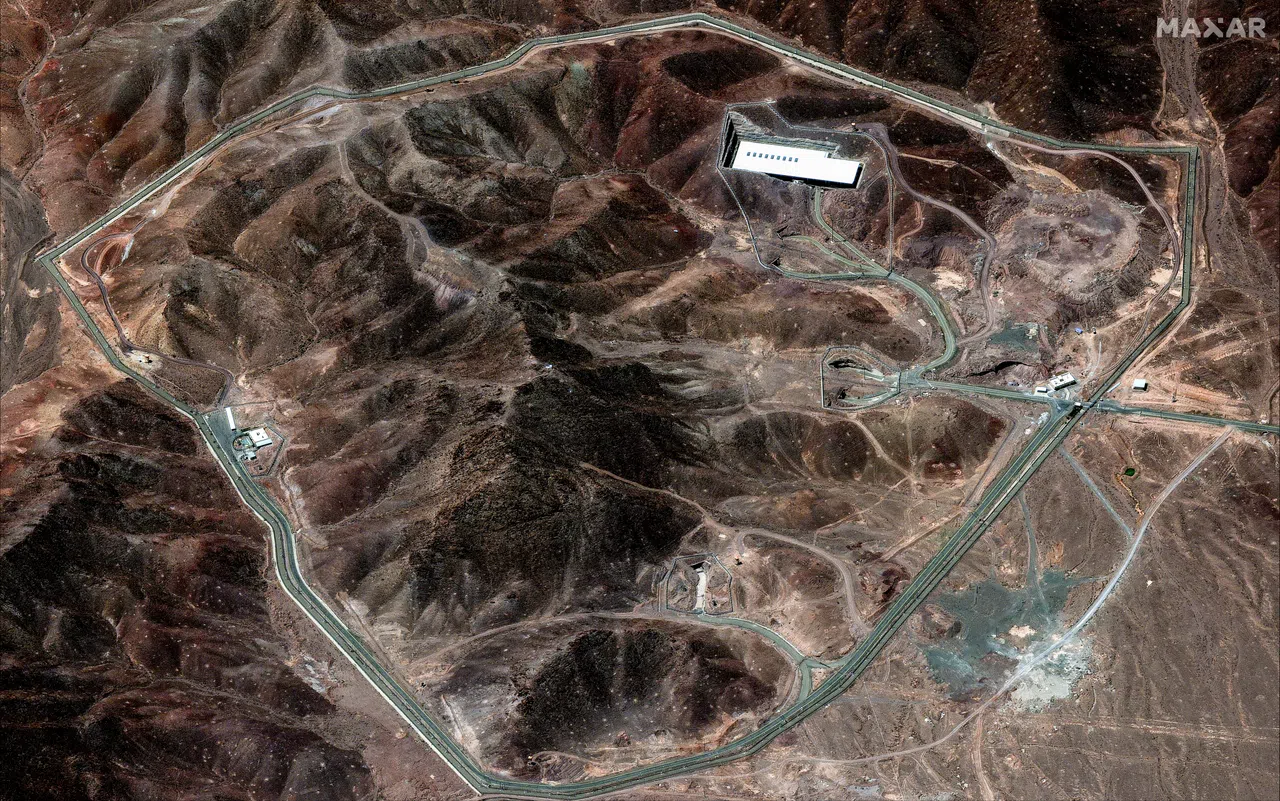Israel seeks swift action on Iran, sources say, with a split US administration
Sign up now: Get ST's newsletters delivered to your inbox

US President Donald Trump (centre) Vice-President J. D. Vance (left) and Defence Secretary Pete Hegseth reportedly took part in a tense June 19 call with Israel's leaders over Mr Trump's two-week deadline on whether to strike Iran.
PHOTO: REUTERS
WASHINGTON/DUBAI/JERUSALEM - Israeli officials have told the Trump administration they do not want to wait two weeks for Iran to reach a deal to dismantle key parts of its nuclear programme and Israel could act alone before the deadline is up, two sources said, amid a continuing debate on Mr Trump's team about whether the US should get involved.
The two sources familiar with the matter said Israel had communicated their concerns to Trump administration officials on June 19 in what they described as a tense phone call.
The Israeli officials said they do not want to wait the two weeks that US President Donald Trump presented
The Israeli participants on the call included Israeli Prime Minister Benjamin Netanyahu, Defence Minister Israel Katz and military chief Eyal Zamir, according to a security source.
The Israelis believe they have a limited window of opportunity to move against the deeply buried site at Fordow, the crown jewel of Iran’s nuclear programme, said the sources.
The US is the only country with the bunker-busting bombs
Reuters reported on June 21 that the US is moving B-2 bombers
The B-2 can be equipped to carry America's 30,000-pound GBU-57 Massive Ordnance Penetrator, designed to destroy targets deep underground, such as the one at Fordow.
A person in Washington familiar with the matter said Israel has communicated to the US administration that it believes Mr Trump’s window of up to two weeks is too long and that more urgent action is needed.
The person did not say whether the Israelis made that point during the high-level call.
During the call, Vice-President J.D. Vance pushed back, saying the US shouldn’t be directly involved and suggesting that the Israelis were going to drag the country into war, said the sources.
Defence Secretary Pete Hegseth also participated in the call, said a security source.
Reuters could not determine who else took part in the call.
The Jerusalem Post reported earlier that a phone call had taken place on June 19.

During the phone call, US Vice-President J.D. Vance reportedly pushed back against Israeli efforts to get the US involved in striking Iran.
PHOTO: AFP
The prospect of a US strike against Iran has exposed divisions in the coalition of supporters
Mr Vance has frequently criticised past US involvement in conflicts, including Iraq and Afghanistan, but has lately defended Mr Trump against Republican critics who urge the administration to stay out of the Iran conflict.
Other Republicans, including Trump ally Senator Lindsey Graham of South Carolina, have said they hope Mr Trump will help Israel finish destroying Iran’s nuclear programme.
Mr Trump, who campaigned on a promise to keep the US out of what he called “stupid” foreign wars, has himself seemed conflicted at times about whether to join the Israeli attack on Iran or focus on diplomatic efforts to end Tehran’s nuclear programme. But his rhetoric in recent days has become increasingly aggressive towards Iran.
Iran insists that its nuclear programme is for peaceful purposes only.
The White House declined to comment for this story.
The Israeli Prime Minister’s office did not immediately respond to a request for comment.
Iran’s mission to the United Nations also did not immediately respond.
Fordow strike likely
Publicly, Mr Netanyahu has not ruled out Israel attacking Fordow alone, though officials have not provided any details on how that would be achieved.
Four sources said it is now increasingly likely that the country will launch a solo military operation. Israeli air superiority over much of Iran makes an operation more feasible, though still risky, said two of the sources.
The Israelis feel they have the momentum and have limited time given the costs of the war, one source added.
“I don’t see them waiting much longer,” said the source.

A June 14 Maxar satellite image showing the site of Iran’s deeply buried Fordow nuclear facility.
PHOTO: EPA-EFE
It is not clear whether such an operation would involve bombing, ground forces, or both. Two of the sources said that rather than attempting to destroy the entire site Israel could instead do significant damage to it.
That could mean focusing on destroying what is inside the site rather than the site itself, said one of the sources, declining to elaborate.
Some analysts have speculated that Israel could use special forces to enter Fordow and blow it up from inside.
Another scenario being considered, according to a source familiar with the matter, would be to drop a series of munitions in rapid succession in an attempt to breach the fortified site, similar to how the Israeli military killed Hezbollah leader Sayyed Hassan Nasrallah in 2024.
Such a strike could be followed by an incursion by special forces, the source said.
It is not clear that Israel has munitions powerful enough to penetrate the fortified facility. It is widely believed that to have a high chance of success, US intervention would be needed.
But even with the massive firepower of a joint US-Israeli military action, military and nuclear experts believe that a military operation would probably only temporarily set back a programme the West fears is already aimed at producing atomic bombs one day, although Iran denies it. REUTERS


